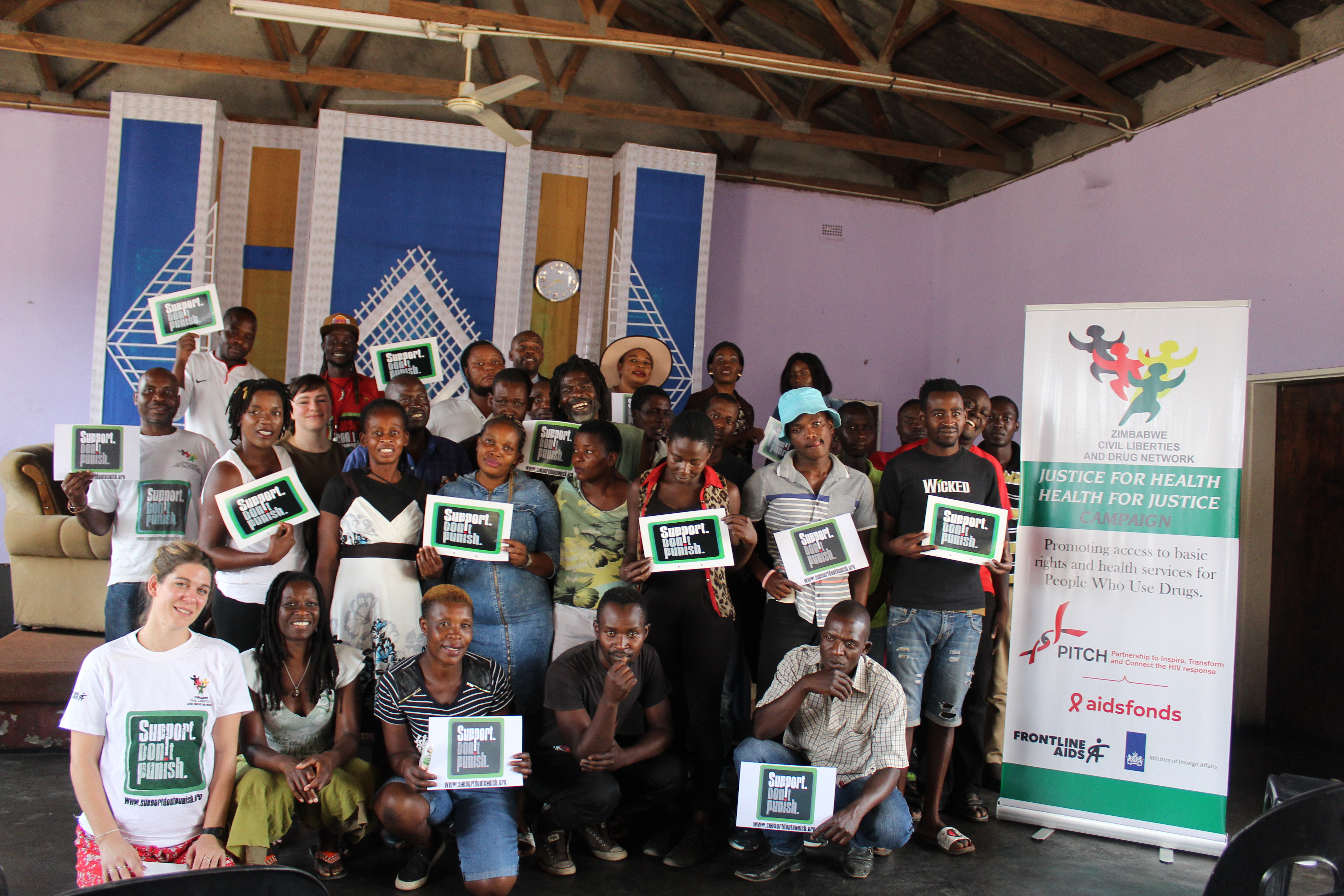By Nyasha Mutena
In a move that seeks to address the illicit drug challenge that is currently grappling the country, Zimbabwe Civil Liberties Drug Network Drug Network is undertaking community campaigns which enable them to interact with drug users whilst sensitizing them on the dangers surrounding drug use.
Addressing various youth who are using and/or witnessing the retrogressive nature of drugs in Mufakose yesterday, Projects Executive Director Mr Wilson Box said drugs are a huge set back but it was their mandate to identify the challenges faced by users and to see how best they could be addressed.
He said criminalizing drug users was not even close to being the solution that is what prompted ZCLDR to seek a solution to the catastrophe that is causing the death of many young people through interacting with them and finding common ground.
Speaking at the same event, Member of Parliament for Mufakose Constituency, Hon Susan Matsunga commended ZCLDN for effort it has invested in addressing the drug problem.
She said eradicating HIV/AIDS by 2030 was impossible if the young sex workers and boys who are using drugs saying they engage in unprotected sex when they are high on drugs which exposes them to a lot of STIs and HIV.
“United we stand as we all know, by 2030 we want to close the tap of HIV/AIDS but it is not achievable if we leave behind young sex workers and boys who use drugs because they are exposed to it as long as we don’t discuss this openly and address the challenges encountered,” said Hon Matsunga.
She said ZCLDN is already reaping fruits with testimonies of quitters, amongst them one Feiton Mpakami whom she described as a hardcore drug addict she never imaged leading a sober life let alone marry and have children.
“We are seeing testimonies ever since ZCLDR got down to business and one of them is Feiton, he is an ex drug addict, now married and a father to be with the help of ZCLDR, I never thought I would see the day this young man quit drugs,” Hon Matsunga said.
She urged drug users to quit drugs and think about their future and the welfare of their offspring.
Medical Sister Lanjesi Bhakali appealed to the law enforcers to adjust the laws and accommodate drug users.
“We; are appealing to the law enforcers to desist from criminalising drug users, HIV/AIDS remains a gigantic challenge with drug users, something has to be done to promote harm reduction,” said Sister Bhakhali.
Detective Inspector Majaha Mkwananzi said the police were never after the drug users but rather on the peddlers but distinguishing the users and peddler when they undertake raids was quite a problem.
He said it was up to drug users to choose their chill spots wisely because if the police were to find them at the bases they have no option but to arrest them.
“Currently we do not have a distinction between a drug user and a peddler but we are trying to create an environment which exempts the user from being arrested.
“As Police we understand where ZCLDN is taking us but we also need help from the users to seek help or get out of habitual use to avoid being found at strategic places where drugs are sold,” said D.I Mkwananzi.
Advocate Kuzivakwashe Ngodza, a human rights lawyer said the most important human right is his/her right to dignity therefore drug users have a right to their dignity but they had to let the police enforcers to their procedures when they find them at drug bases.
She however encouraged them to report the police whenever they feel they been disrespected in any way.
“The key element in the nature of all cases is dignity, despite using drugs you still have a right to dignity however you should understand police procedures that are undertaken when they find you at bases, it’s never about you but the peddler,” said Advocate Ngodza.
At the opening of the UN General Assembly special session on the world drug problem, Executive Director of United Nations Office on Drugs and Crime (UNODC), Yury Fedotov said;
“Putting people first means reaffirming the cornerstone principles of the global drug control system, and the emphasis on the health and welfare of humankind that is the founding purpose of the international drug conventions,”
This recognizes that to address and counter the world drug problem, appropriate emphasis should be placed on individuals, families, communities and society as a whole, with a view to promoting and protecting the health, safety and well-being of all humanity.
“Putting people first means balanced approaches that are based on health and human rights, and promote the safety and security of all our societies. Putting people first means looking to the future, and recognising that drug policies must most of all protect the potential of young people and foster their healthy styles of life and safe development,” he added.
Drug use refers to the use of drugs for psychotropic rather than medical purposes. Among the most common psychotropic drugs that are trending in Zimbabwe are Glue, Bronc cleer cough syrup, Musombodhiya, Histalix, Marijuana, Crystal meth among others. The term drug use is normally applied to excessive and addictive use of drugs because such drugs can have severe physiological and psychological, as well as social, effects, many governments regulate their use.
